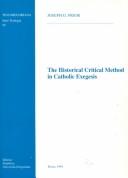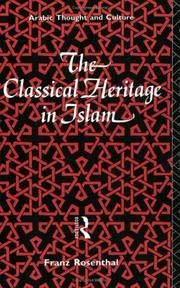| Listing 1 - 10 of 53 | << page >> |
Sort by
|
Book
ISBN: 9783161535710 3161535715 Year: 2015 Volume: 95 Publisher: Tübingen Mohr Siebeck
Abstract | Keywords | Export | Availability | Bookmark
 Loading...
Loading...Choose an application
- Reference Manager
- EndNote
- RefWorks (Direct export to RefWorks)
Book
ISBN: 9780802869807 Year: 2014 Publisher: Grand Rapids, Michigan : William B. Eerdmans Publishing Company,
Abstract | Keywords | Export | Availability | Bookmark
 Loading...
Loading...Choose an application
- Reference Manager
- EndNote
- RefWorks (Direct export to RefWorks)
Book
ISBN: 9782875589088 2875589083 9782875589095 2875589091 Year: 2020 Publisher: Louvain-la-Neuve: Presses universitaires de Louvain,
Abstract | Keywords | Export | Availability | Bookmark
 Loading...
Loading...Choose an application
- Reference Manager
- EndNote
- RefWorks (Direct export to RefWorks)
Qui n'aime pas les animaux ? Aujourd’hui, la question animale est devenue un enjeu sociétal important. La Bible aurait-elle toujours quelque chose à nous apprendre sur ce sujet ? Cet ouvrage propose sept enquêtes menées dans toutes les parties du corpus de l’Ancien Testament (récits, lois, prophéties, écrits de sagesse) et selon diverses approches (narratologie, histoire rédactionnelle, linguistique, anthropologie biblique, etc.). Chacune d’elles, à sa façon, démontre la pertinence du recours à l’Écriture aussi bien pour penser le rapport de l’humain à l’animalité que pour relever les défis auxquels l’homme contemporain est confronté dans son rapport aux autres vivants et au monde qu’il habite en commun avec eux.
Book
ISBN: 9021137003 9789021137001 Year: 1998 Publisher: Zoetermeer Meinema
Abstract | Keywords | Export | Availability | Bookmark
 Loading...
Loading...Choose an application
- Reference Manager
- EndNote
- RefWorks (Direct export to RefWorks)
Book
ISBN: 3783104661 9783783104660 Year: 1975 Publisher: Stuttgart Kreuz
Abstract | Keywords | Export | Availability | Bookmark
 Loading...
Loading...Choose an application
- Reference Manager
- EndNote
- RefWorks (Direct export to RefWorks)
Book
ISBN: 9780567666406 0567666409 9780567666413 9780567669322 0567669327 0567666417 Year: 2019 Publisher: London Bloomsbury T&T Clark
Abstract | Keywords | Export | Availability | Bookmark
 Loading...
Loading...Choose an application
- Reference Manager
- EndNote
- RefWorks (Direct export to RefWorks)
Meals are a highly significant element in the development of Christian identity. In this handbook Soham Al-Suadi and Peter-Ben Smit present chapters that situate early Christian meals in their broader context, with a focus on the core topics that will help us to understand Greco-Roman meal practice and how this relates to Christian origins. The issues covered include: the role of gender during meals; issues of monotheism and polytheism that arise from the structure of the meal; how sacrifice is understood in different meal practices; power dynamics during the meal and issues of inclusion and exclusion at meals. In addition to looking at the broader Hellenistic context the chapters explain the unique nature of Christian meals, and what this says about early Christian communities. The handbook is structured around the key primary resources, with the literary, historical, theological and philosophical aspects of these resources being considered in turn. The handbook begins with Hellenistic documents/authors before moving on to the New Testament material itself according to genre (Gospels, Acts, Letters, Apocalyptic Literature). Finally, there is a section on the wider resources that describe daily life in the period (medical documents, inscriptions). This structure enables the editors and contributors to present an analysis of the social values exhibited at meals and their significance for early Christian theology

ISBN: 8876528253 9788876528255 Year: 2001 Volume: 50 Publisher: Roma: Pontificia Università Gregoriana,
Abstract | Keywords | Export | Availability | Bookmark
 Loading...
Loading...Choose an application
- Reference Manager
- EndNote
- RefWorks (Direct export to RefWorks)
22.06 --- 22.06*4 --- 22.06*4 Bijbel: kritische exegese conservatieve eruditie vrij onderzoek --- Bijbel: kritische exegese conservatieve eruditie vrij onderzoek --- Bijbel: exegese hermeneutiek --- 22.06*4 Bijbel: kritische exegese; conservatieve eruditie; vrij onderzoek --- Bijbel: kritische exegese; conservatieve eruditie; vrij onderzoek --- Bijbel: exegese; hermeneutiek --- Bible --- Criticism, interpretation, etc. --- Hermeneutics. --- Study and teaching --- Catholic Church. --- Biblia --- Catholic Church --- Hermeneutics --- Criticism, interpretation, etc
Book
ISBN: 9789460014673 9789460014680 9460014674 9460014682 Year: 2016 Publisher: Antwerpen Vrijdag
Abstract | Keywords | Export | Availability | Bookmark
 Loading...
Loading...Choose an application
- Reference Manager
- EndNote
- RefWorks (Direct export to RefWorks)
Bible --- 223.9 --- bijbelbeschouwingen --- bijbels --- cultuur --- geschiedenis --- waarden --- bijbelverklaringen en -beschouwingen - bijzondere onderwerpen --- 22.06*4 --- 22.06*4 Bijbel: kritische exegese; conservatieve eruditie; vrij onderzoek --- Bijbel: kritische exegese; conservatieve eruditie; vrij onderzoek --- Bijbelverklaring

ISBN: 0415076935 Year: 1992 Volume: vol *8 Publisher: London Routledge
Abstract | Keywords | Export | Availability | Bookmark
 Loading...
Loading...Choose an application
- Reference Manager
- EndNote
- RefWorks (Direct export to RefWorks)
Eruditie [Mohammedaanse] --- Erudition islamique --- Islamic learning and scholarship --- Mohammedaanse eruditie --- Civilization, Islamic --- -Islamic learning and scholarship --- Learning and scholarship --- Muslim learning and scholarship --- Muslims --- Muslim civilization --- Civilization --- Civilization, Arab --- Greek influences --- Intellectual life --- Islamic civilization
Book
ISBN: 9782705690779 2705690778 Year: 2015 Publisher: Paris: Hermann,
Abstract | Keywords | Export | Availability | Bookmark
 Loading...
Loading...Choose an application
- Reference Manager
- EndNote
- RefWorks (Direct export to RefWorks)
La Bible hébraïque est le récit d'un choix très particulier : celui de la vie. Ce choix est le fait d'un peuple (Israël), c'est-à-dire qu'il implique à la fois la subjectivité individuelle et la décision de vivre-ensemble dans une société gouvernée par l'alliance (brith), visant la justice (tsedek) et la fraternité symbolique. Ce choix oblige chacun à se garder de l'inceste : s'il ne sacrifiait pas la jouissance interdite, s'il n'expiait pas les fautes engendrant la culpabilité, s'il acceptait l'impureté (toum'ah), le sujet ferait alors le choix inverse, celui de la mort. Il serait ainsi confiné dans la tristesse et le renoncement au désir : dans le lien social, l'inceste traduit une volonté de mort, une tentative fantasmatique de fusionner avec le grand Autre. Autrement dit, la Bible, telle que l'auteur l'interprète, est un écrit de philosophie politique, au sens antique de l'expression, intriquant règles, lois positives et Loi symbolique inconsciente pour construire un peuple.
Judaism and psychoanalysis --- Psychanalyse --- Aspect religieux --- Judaïsme --- Bible --- Criticism, interpretation, etc. --- Psychology --- 221.06*4 --- Oud Testament: kritische exegese; conservatieve eruditie; vrij onderzoek --- 221.06*4 Oud Testament: kritische exegese; conservatieve eruditie; vrij onderzoek --- Judaïsme --- Psychology.
| Listing 1 - 10 of 53 | << page >> |
Sort by
|

 Search
Search Feedback
Feedback About UniCat
About UniCat  Help
Help News
News